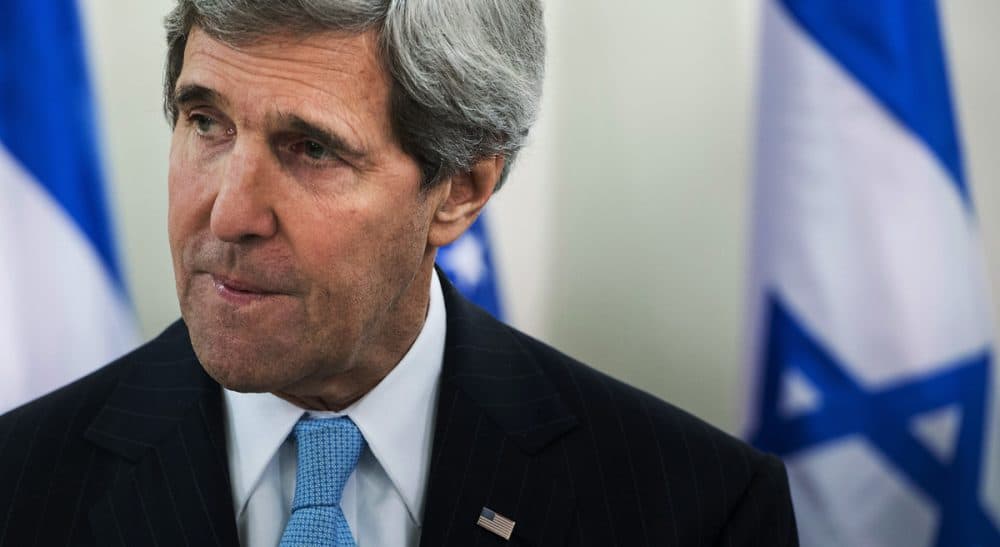Advertisement
Is John Kerry Israel’s Last Best Hope?

In the next few months we will find out whether John Kerry’s energetic push to settle the conflict between Israelis and Palestinians has borne fruit. Israel does not seem keen on the talks; its minister of defense has described Kerry as “obsessive” and “messianic,” adding that it would be best if the secretary “won his Nobel [prize] and left us alone.” Prime Minister Benjamin Netanyahu, ever indignant about anti-Israeli propaganda in the Palestinian media, has rejected a proposed joint committee meant to reduce incitement.
The Palestinians are skeptical as well: President Mahmoud Abbas recently announced that recognizing Israel as a Jewish State was "out of the question." And, echoing a statement by Netanyahu, he proclaimed that Secretary Kerry “has the right to do whatever he wants… and we [the Palestinians] have the right to say whatever we want."
Given the bleak record of past attempts, the difficulty of the questions at stake and the mistrust between the parties (not to speak of the internal tensions afflicting each), another failure is far more likely than a breakthrough. The Israelis, at least, don't sound terribly worried about the negotiations faltering. Their economic prosperity, military might and, more than anything, the unconditional backing of the United States have convinced them that the status quo is tenable indefinitely.
Rebuffing Secretary Kerry will expedite a process of American disengagement that Israel, if it is to survive in any recognizable form, cannot afford.
But it’s not. Suppose Kerry fails. How long can Israel count on the status quo to last? According to the International Energy Agency’s (IEA) World Energy Outlook, the United States is projected to produce more oil than Saudi Arabia by the end of the decade. By 2030 the U.S. will become energy independent. The economic equation that dictated the centrality of the Middle East throughout the 20th century and the beginning of the 21st is changing. The area is losing its ability to generate a massive economic crisis in North America and, as it does, the Americans are becoming less concerned about what happens there. The ceding of the stage to Russia in the recent Syrian crisis and America’s indifference about upheavals in Egypt suggest that this process is already underway.
With a reduction in the importance of Mideast oil, Israel, as a Western outpost in an oil rich region, is beginning to matter less. If current trends continue, it could find itself without the backing of its traditional ally. What would it do then? Since the threats Israel faces are unlikely to subside (the continued rise of Iran and its client militia Hezbollah, the instability in neighboring Egypt, Syria and Lebanon, the possibility of a revolution in minority-ruled Jordan, the infiltration of Al Qaeda affiliates into the Gaza Strip and the West Bank, to name a few), it would need new friends. An alliance with Saudi Arabia could prove attractive. The Jewish state would also have to seek backing from a new super power. The leading candidate would be a resurgent Russia, which has, of late, been showing a great deal of interest in Middle Eastern politics. The Chinese, who are set to become the primary consumers of Persian Gulf oil, are also likely to offer patronage in exchange for technology sharing.
But if Israel formed friendships with Saudi Arabia, Russia and China, it would become harder for Israel to maintain its self-understanding as the only democracy in the region. You don’t get to call yourself a democracy when your close friends persecute homosexuals, censor the internet, hound dissidents and refuse to allow women to leave the house unaccompanied (this on top of maintaining a 47-year occupation of the Palestinians and their lands). With the development of such ties, Israel would move further and further out of the camp of western states. It would, gradually, cease to be itself.
Here, then, is a good reason to root for Kerry. A deal with the Palestinians, achieved through American mediation, will bind the U.S. to Israel — legally, politically and morally, for the next few decades. The Americans would have to finance much of the agreement, supply guarantees for its implementation, and help police its terms. In fact, Israel should not agree to a settlement that does not involve long-term, intensive American involvement in monitoring and implementation. Such continued American commitment would be a remarkable “side effect” of making peace with the Palestinians, an outcome equal in importance, perhaps, to the actual resolution of the conflict.
Rebuffing Secretary Kerry will expedite a process of American disengagement that Israel, if it is to survive in any recognizable form, cannot afford. And embracing his initiative will slow down this process indefinitely. If the Israelis know what's good for them, they should hope that Kerry gets his Nobel Peace Prize for sticking around and seeing things through.
Related:
